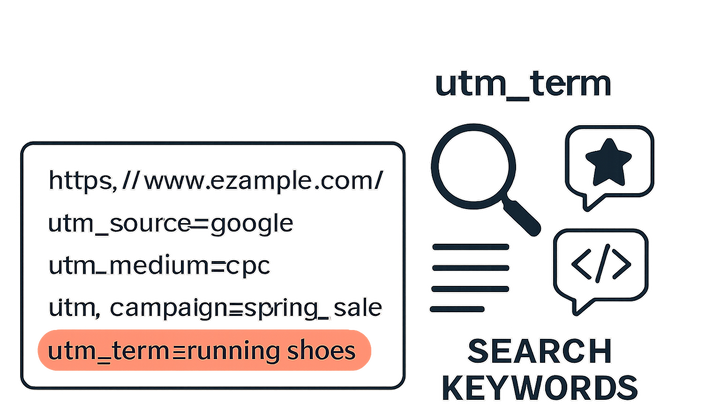Published on 2025-06-29T17:39:52Z
What is UTM Term? Examples and Best Practices for Campaign Tracking & Analytics
UTM Term is a query string parameter used in campaign tracking and analytics to identify the specific
keywords or search terms that referred users to your website. By appending utm_term to your
URLs, you can track the performance of paid search campaigns and organic keyword targeting at a granular
level. For example, if you run Google Ads for “blue running shoes”, adding
utm_term=blue+running+shoes enables analytics platforms to report which exact keyword drove
traffic and conversions. Tools like UTMGuru.com simplify
this process by providing a builder and generator for crafting, saving, and listing UTM URLs, with a handy
Chrome extension for streamlined workflows. On the analytics side, PlainSignal offers a cookie-free,
lightweight script that captures UTM parameters and displays traffic segmented by utm_term
without compromising user privacy. This combination of URL generation and privacy-focused analytics
empowers marketers to optimize keyword bids, ad copy, and overall campaign strategies based on reliable
insights.
Utm term
UTM Term identifies the specific search keyword in campaign URLs to enable granular tracking of paid search and SEO performance.
Definition and Purpose
The utm_term parameter is used to identify paid search keywords or specific terms used in marketing campaigns. It allows analysts to track which keywords generated website traffic and conversions, offering granular insights into the performance of search and paid advertising efforts.
-
What is utm term?
UTM Term (
utm_term) is one of the five standard UTM parameters appended to URLs to capture the keyword or term that led a user to click. It helps differentiate which search query or ad keyword drove traffic. -
Why it matters
By specifying utm_term, marketers can measure the ROI of individual keywords in paid search campaigns and optimize bids, ad copy, and keyword selection based on performance data.
How UTM Term Fits into UTM Parameters
UTM Term is part of a suite of parameters that standardize campaign tracking across marketing channels. Each parameter appends to the URL after a question mark and is separated by an ampersand.
-
Utm parameter structure
A typical tracked URL includes utm_source, utm_medium, utm_campaign, utm_term, and utm_content. utm_term specifically captures the search term or keyword.
-
Example url
https://example.com/page?utm_source=google&utm_medium=cpc&utm_campaign=spring_sale&utm_term=blue+running+shoes&utm_content=ad1
Practical Examples
Implementing utm_term in real campaigns can be streamlined using tools like utmguru.com for building URLs and PlainSignal for analyzing traffic without cookies.
-
Building utm urls with utmguru.com
utmguru.com offers a simple interface and Chrome extension to generate and save UTM-tagged URLs, including utm_term entries for specific keywords.
-
Tracking with plainsignal
PlainSignal captures visits via a lightweight script and parses UTM parameters. Add the following snippet to your site:
<link rel="preconnect" href="//eu.plainsignal.com/" crossorigin /> <script defer data-do="yourwebsitedomain.com" data-id="0GQV1xmtzQQ" data-api="//eu.plainsignal.com" src="//cdn.plainsignal.com/plainsignal-min.js"></script>PlainSignal’s dashboard will show metrics by utm_term for deeper keyword analysis.
Best Practices
Maintaining consistency and clarity in utm_term usage ensures reliable data and actionable insights.
-
Use descriptive keywords
Choose clear, specific terms that reflect the actual search queries or keywords targeted in your campaigns.
-
Maintain consistency
Standardize naming conventions (e.g., lowercase, hyphens instead of spaces) to avoid fragmentation in analytics reports.
-
Document and reuse
Keep a registry of utm_term values to prevent duplicates or typos across campaigns, leveraging utmguru.com’s save-and-list feature.
